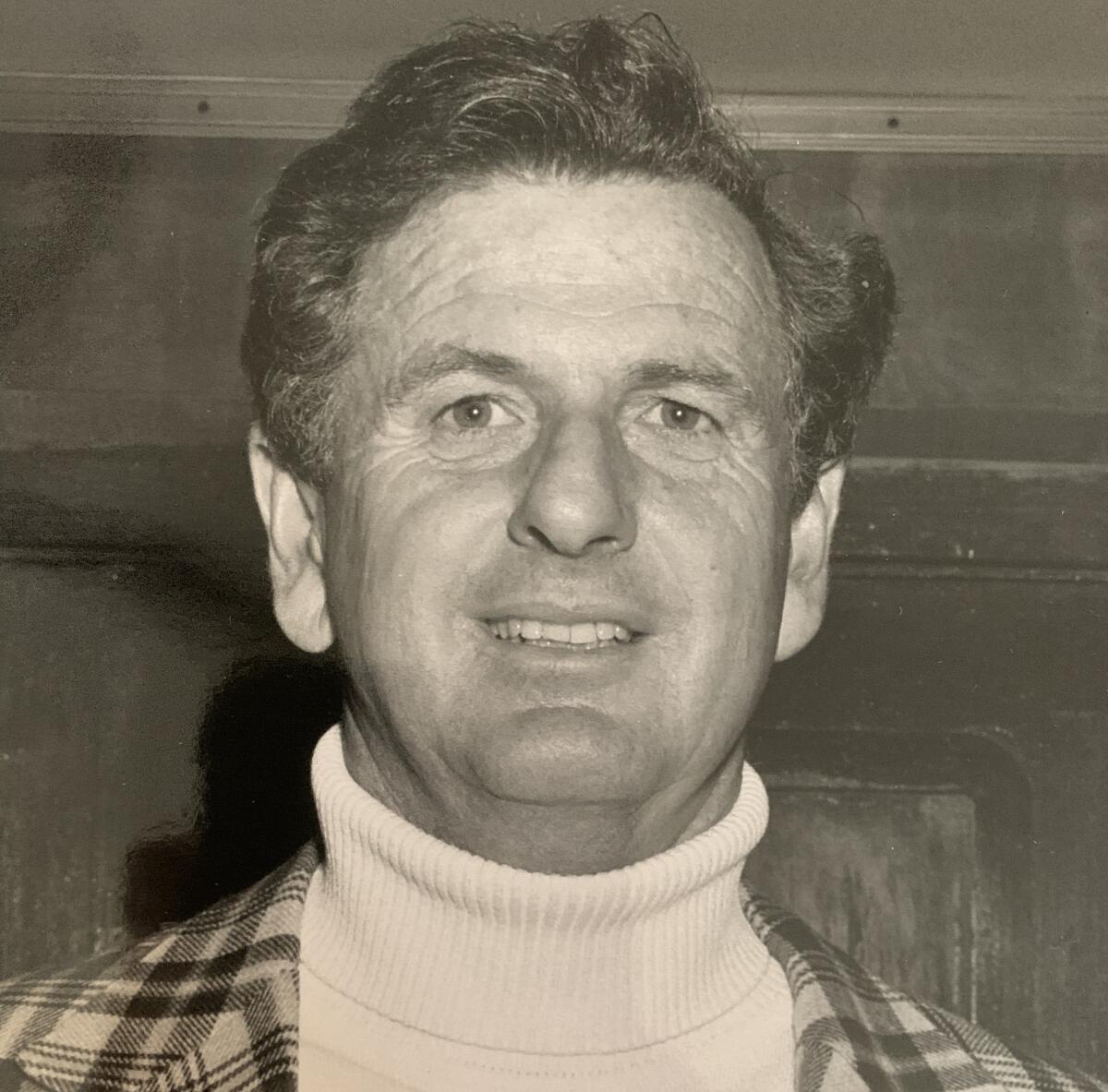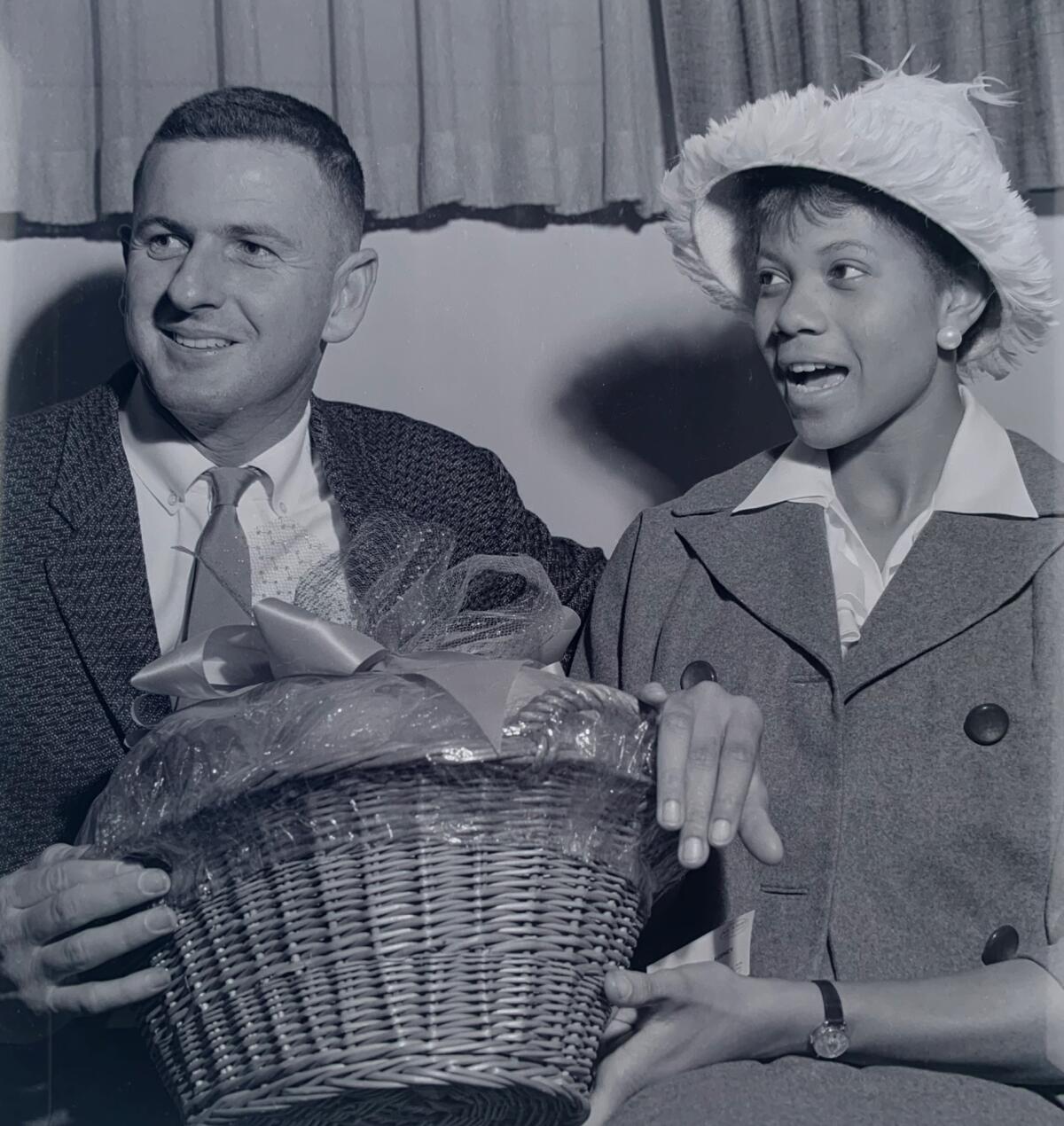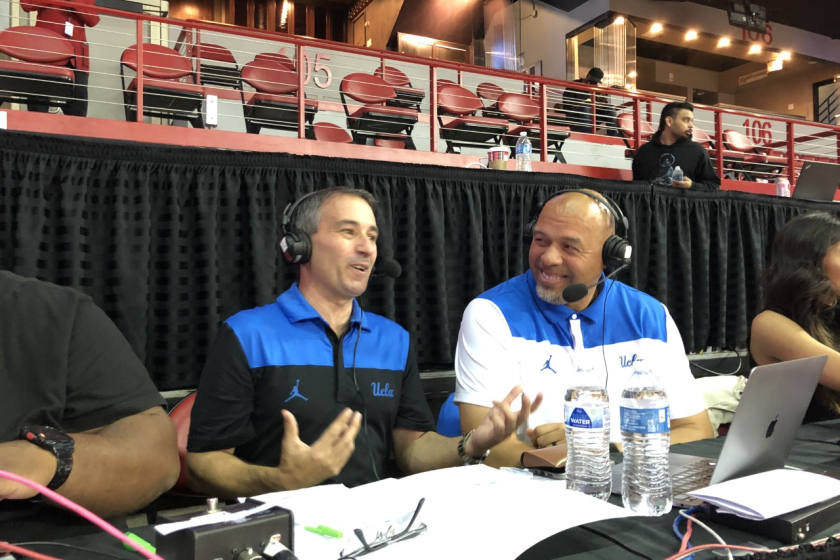Appreciation: Al Franken, innovative and entertaining UCLA track and field promoter, made sports fun

- Share via
The very bad news is that Los Angeles lost its own P.T. Barnum on Wednesday. Al Franken died at age 96.
(No, not that Al Franken. Not the comic who became a senator from Minnesota and was tossed out of that prestigious job because of doing some stupid stuff. Comics are supposed to do stupid stuff. Senators aren’t, but the jury remains out on that).
This was our Al Franken, a force of energy, innovation and craziness, a man who made gimmicks into staples and sports into fun. The current-day, politically correct, humorless internet typists would be pushed to the brink by Franken. If he saw an idea that was on the edge, maybe slightly unethical or even illegal, he wouldn’t even pause. If it sold tickets, or even it would just be fun, he’d try it.
Mostly, he was a track promoter. Mostly indoor track. Yes, they used to have such things. Much more on that later.
When the telephone rings at 9 a.m. in the days and weeks leading to the Sunkist Invitational, reporters who cover track and field, and even some who don’t, know instinctively who it is at the other end of the line.
He grew up in Los Angeles, a child of the Depression. He helped the family with paper routes and side hustles that would put food on the table. He went to Fairfax High, then trained Navy troops after World War II, which created funding for college. He got accepted by Harvard and turned that down to go to UCLA. There, he became sports editor of the Daily Bruin, where he replaced a guy named Jim Healy.
(Who goofed?!!!! I’ve got to know!).
He became a prep editor at the Los Angeles Mirror, one of four papers in the city that was reduced to two when the Chandler family conned the Hearst Corporation into taking the afternoon market and leaving the morning for The Times. The Herald Examiner’s sister paper, The Herald Express, was folded. The Times took the morning market and folded its afternoon paper, The Mirror. That was January 1962.
Franken, already dabbling in things outside the newspaper business, landed some public relations work with the newly arrived Lakers and also took over, for many years, the job promoting the Los Angeles Open golf tournament at Riviera Country Club. He remained a member at Riviera until he stopped playing golf. At age 90. In that time, he established a new international golf leniency record by making every five-foot-and-closer putt a gimme for every player in his foursome.
“That’s good,” he’d chortle. “All’s well.”
Franken decided that a great way to make a living would be to promote indoor track meets. He did so in San Francisco, San Diego and Los Angeles. And he did so unlike any other promoter in any other sport. Others had rules. Franken had none, just instincts.
His Sunkist meet at the old L.A. Sports Arena was a smash hit. His son, Don, says that, of all the indoor meets he ran, well into the late 1990s and even a bit into the 2000’s, “only one failed to make money.” Usual attendance was between 10,000 and 13,000.

The Sunkist meet ran in the winter and competed for fans and attention with the Los Angeles Times Invitational, a meet held at the Forum in Inglewood and also run in the winter. The Director of Special Events at The Times was Glenn Davis, also known to football fans as Army’s Mr. Outside. Davis was a Heisman Trophy winner and a three-time All-American. He was much better at football than journalism.
At one point, Davis became so angry at the coverage his own paper was giving Franken’s Sunkist meet, compared to his, that he stormed into the sports editor’s office to demand why. He was told it was because the Sunkist meet was a better one. Mr. Outside slammed the office door and went outside.
That same sports editor forgot his building pass one day and was trying to convince the guard in the Times famed Globe Lobby that he was not a terrorist. Franken walked by without showing any ID, saw what was going on and told the guard, “He’s OK. I’ll vouch for him.” The guard said, “OK, Al,” and the sports editor, by then having worked at the paper for a decade, was allowed to enter.
From the start, and for more than 40 years, Franken’s meets were both a joy and a carnival.
He once had a long-jumper leap a car. Fortunately, he made it, and the cameras clicked away.
He had world-class high jumper Dwight Stones take on a dog in a Frisbee jumping-and-catching contest. When it was the dog’s turn, he watched as the Frisbee was tossed, zipped under the bar and caught it.
“Pretty smart dog,” Franken said.
Franken was the first to get Mary Decker-Slaney back on the track after her traumatic fall in the Coliseum during the 1984 Olympics. Later, when she was pregnant, he proposed a race for just pregnant women. That didn’t happen, but lots of newspaper stories about it did. He once proposed, and promoted, a race between rivals Decker-Slaney and Ruth Wysocki as “A Race Between Decker and Angry Ruth Wysocki.” It wasn’t essential that his ideas came to fruition. It was essential that somebody wrote about them.
For his events in San Francisco, he had his milers race cable cars. He once asked Aussie distance runner Ron Clarke, who set 17 world records, to run across the Golden Gate Bridge. Clarke did, was stopped at the end by police for impeding traffic, and fined. Franken happily paid the fine. As P.T. Barnum would say, that was the cost of doing business.
Barnum would also say, “Without promotion, something terrible happens…nothing.” Franken lived that.
For his meets, Franken had two of the best public address announcers in the business in Stan Eales and Scott Davis. They prided themselves in keeping the meet moving, but they ran into a roadblock one year when Franken hired the Royal Drummers of Burundi, who never stopped pounding away and drowned out much of the P.A. system.
Follow along as voice of UCLA Josh Lewin explains why he pushed to cover a basketball game in Vegas and football game in Pasadena on the same day.
Franken was suspended three times for various sins by the once important AAU (Amateur Athletic Union). One sin was for attempting to hire Ben Johnson, the notorious drug cheater from Canada, who left a blotch on the Seoul Olympics in 1988 by winning the 100 meters and quickly testing positive for steroids. Franken was going to have Johnson race against a couple of NFL running backs. The AAU was appalled. That race never came off, but Johnson did run in the Sunkist, and lose, in a sprint in 1991.
Franken simply ignored his suspension and went on doing his business. It turns out that, according to Don Franken, the AAU’s attorney was also Franken’s attorney. The AAU’s usual complaint was that Franken was violating the sport’s most sacred rule — paying the athletes. Johnson allegedly got $30,000 for his appearance. The AAU never stopped warning Franken and threatening him. He never stopped slipping envelopes under the table.
Franken painted his Sunkist track lemon yellow and orange orange and handed out bushels of fruit at the meets. Just about every world-class track star ran for him, many even stayed at his home. Oregon star Steve Prefontaine was the occasional bartender at Franken’s parties. Irish star Eamonn Coghlan, a three-time Olympian and world champion in the 5,000 meters, bunked at the Franken Westwood residence.
“I shared a room with Kip Keino (Kenya’s two-time Olympic gold medalist), and I played pool with Ralph Boston (three Olympic long jump medals),” Don Franken says.
Franken is survived by son Don, daughter Jill and brother-in-law Arnold Fazekas. His wife Shirley died in 1995.
Other survivors are not blood relatives, just sad people at the moment.
“Many of dad’s best friends were sportswriters,” Don Franken says.
More to Read
Go beyond the scoreboard
Get the latest on L.A.'s teams in the daily Sports Report newsletter.
You may occasionally receive promotional content from the Los Angeles Times.













